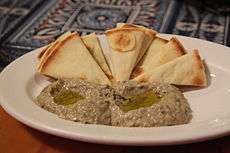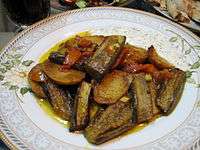Baba ghanoush
Baba ghanoush (UK: /ˌbɑːbə ɡæˈnuːʃ/, US: /- ɡəˈnuːʃ, - ɡəˈnuːʒ/;[3][4][5] Arabic: بابا غنوج, romanized: bābā ġannūj), also spelled baba ganoush or baba ghanouj,[3][4][5][1] is a Levantine appetizer of mashed cooked eggplant mixed with tahini (made from sesame seeds), olive oil, possibly lemon juice, and various seasonings.[5][1] Traditionally, mutabbal is the condiment aforedescribed and baba ghanoush is more like a salad dip made with pomegranate molasses (or pomegranate seeds) and olive oil, and often without tahini. It may be mixed with onions, tomatoes, or other vegetables.
 | |
| Course | Appetizer |
|---|---|
| Place of origin | Lebanon[1] |
| Associated national cuisine | Iraq, Armenia,[2] Israel, Jordan, Lebanon, Palestine, Syria, Egypt, and Turkey |
| Main ingredients | Eggplant, olive oil |
 Moutabbal (or M'tabbal) and pita bread | |
| Course | Appetizer |
|---|---|
| Place of origin | Levant |
| Main ingredients | Eggplant, olive oil |
The traditional preparation method is for the eggplant to be baked or broiled over an open flame before peeling, so that the pulp is soft and has a smoky taste.[6] It is a typical meze ('starter') of the regional cuisine, often eaten as a dip with pita bread, and is sometimes added to other dishes.[1]
Etymology
The bābā is an Arabic word that means 'father' and is also a term of endearment, while ġannūj could be a personal name.[4] The word combination is also interpreted as "father of coquetry" or "indulged/pampered/flirtatious daddy" or "spoiled old daddy".[3][1][7] It is not certain whether the word bābā refers to the eggplant, or to an actual person indulged by the dish.[8]
Varieties
Persian Gulf versions of the dish vary slightly from those of the Levant by spicing it with coriander and cumin;[7] those more traditional versions might be minimally spiced and topped with thinly chopped parsley or coriander leaves.[9]
The Israeli version, salat ḥatzilim, is made with fried or grilled eggplants mixed with mayonnaise, salt, lemon and chopped fried onions.[10][11] It is usually topped with olive oil when served.
See also
- Eggplant salads and appetizers, an overview of similar dishes prepared around the world
- List of dips
- List of eggplant dishes
- List of hors d'oeuvre
- List of Arab salads
References
- Gil Marks (2010). "Baba Ghanouj". Encyclopedia of Jewish Food. Houghton Mifflin Harcourt. ISBN 9780544186316.
- "Baba Ghanoush". Retrieved May 19, 2020.
- "baba ghanouj". The American Heritage Dictionary of the English Language (5th ed.). Boston: Houghton Mifflin Harcourt. Retrieved 25 April 2019.
- "baba ghanouj" (US) and {{Cite Oxford Dictionaries|baba ganoush|accessdate=25 April 2019}}
- "baba ghanoush". Merriam-Webster Dictionary. Retrieved 25 April 2019.
- Khayat, Marie Karam; Keatinge, Margaret Clark. Food from the Arab World, Khayats, Beirut, Lebanon.
- Salloum, Habeeb (2012-02-28). The Arabian Nights Cookbook: From Lamb Kebabs to Baba Ghanouj, Delicious Homestyle Arabian Cooking. Tuttle Publishing. ISBN 9781462905249.
- Marks, Gil (2010-11-17). Encyclopedia of Jewish Food. Houghton Mifflin Harcourt. ISBN 978-0544186316.
- "Baba Ganoush: Quintessentially Levantine". Your Middle East. 2013-01-07. Retrieved 2019-07-29.
- Levy, F. Feast from the Mideast (2003) p.41
- Nathan, J. (2011). Joan Nathan's Jewish Holiday Cookbook. Knopf Doubleday Publishing Group. pp. 57–58. ISBN 978-0-307-77785-0. Retrieved December 23, 2016.
Bibliography
- David, Elizabeth (1950). A Book of Mediterranean Food. Alfred A. Knopf. ISBN 0-394-49153-X.
- Levy, F. (2003). Feast from the Mideast. Harper Collins. ISBN 0-06-009361-7.
- Trépanier, Nicolas (30 November 2014). Foodways and Daily Life in Medieval Anatolia: A New Social History. University of Texas Press. ISBN 978-0-292-75929-9.
